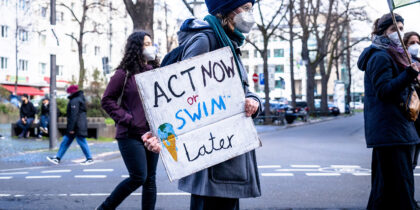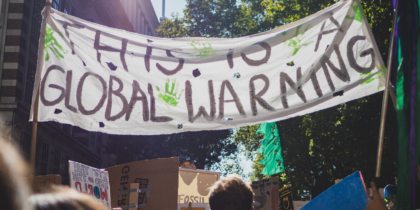By Nick Treloar
Climate change, mental health and race equality. Three issues whose interconnectedness is often overlooked. The signs of climate break down are all around us and their impacts on mental health are taking an increasing toll. And evidence has clearly demonstrated the links between racism (structural, institutional, and individual) and poorer mental health. Where then, do the three overlap?
Climate change and mental health
There is converging global evidence that demonstrates the dire consequences of climate change for our mental health and wellbeing. Climate change is increasingly acting as a ‘risk amplifier’, disrupting socioeconomic, working, environmental, cultural and living conditions – all of which are key to supporting good mental health. Climate change and the breakdown of biodiversity associated with it is causing distress to individuals, and can be defined as an illness , which arises from the direct pollution of the environment) that ‘threatens one’s wellbeing’ and ‘comes from the inability to find solace in one’s home ecosystems’ – for many, this may be more simply known as eco-anxiety.
Work released by the IPCC in 2022 on climate change, adaptation and vulnerability made hundreds of references to mental health, wellbeing, and trauma, demonstrating an increasing awareness of the mental health impacts of climate breakdown. The report stated that ‘Mental health challenges, including anxiety and stress, are expected to increase under further global warming in all assessed regions, particularly for children, adolescents, elderly, and those with underlying health conditions’, and that, ‘Globally, health systems are poorly resourced in general, and their capacity to respond to climate change is weak, with mental health support being particularly inadequate’.
Further to this, the report found that poor households account for twice as much of the disaster losses when evaluated by the effects on their wellbeing. As is so often the case (and just as with Covid) it is the poorest and those living in the most precarious situations who will be hit hardest by the climate breakdown. This is important when we consider what we know already, that the poorest often have the worst mental health outcomes and that poverty has long term scarring effects on the mental health of young people which continues into older age. This is particularly important in the context of the cost-of-living crisis.
Racism and climate change – where they meet
So the links between climate change and mental health are growing, but what role does racism play? Research has consistently shown that environmental racism – unequal access to a clean environment and basic resources – is real. Globally, people of colour are disproportionately likely to live in areas of high pollution, to die from polluting factors and live close to ‘hazardous’ waste. These inequalities are rooted in historical structural racism and are borne out in the unequal outcomes faced by people of colour in housing, employment, education, health care and finances, which all contribute to a greater vulnerability to climate impacts. Again, similarly to Covid-19, being over-exposed and under-protected to these risks means that people of colour are more likely to suffer the adverse consequences of climate change. People of colour in the UK, for example, face higher levels of air pollution than white British people and are more susceptible to the health impacts of pollution.
Specific to the UK, research has shown that people of colour, those living in areas of high deprivation, marginalised groups such as refugees and asylum seekers, disabled people and those experiencing homelessness are all more vulnerable to health problems related to climate change. In addition, systemic racism means that people of colour are more likely to be in low paid work and live in poorer areas that will be most impacted by climate crisis. These poorer areas are often the ones most impacted by a lack of access to green space, have a higher concentration of waste facilities and are disproportionately impacted by air pollution.
Access to green space is an important and often overlooked issue which connects climate change, mental health and racism. Being in green space, restoring ourselves by being in nature and nature regeneration have the power to aid people’s mental health. Undertaking nature-based activities through a social prescribing lens has, for example, been linked with reducing eco-anxiety. However, the current clinical frameworks for mental health care, poor access to green space and increasing pollution are preventing more widespread development(s) of such approaches. Better access to green space can also have a protective factor against heatwaves.
Whilst mentioned all too briefly here it is important too to discuss the issue of displacement. Many increasingly face the reality of having to move as a result of climates becoming unliveable (both in terms of extreme temperatures, but also water shortages and associated conflicts). These issues of displacement disproportionately impact those living in the global south, therefore more likely to be people of colour and those with the fewest existing resources; but also pushes them into facing racism in the new places where they are forced to move to.
Despite immediate and substantial action being required to limit the devastating impacts of climate change, people are increasingly concerned about the lack of action from governments, which in turn worsens eco-anxiety. We have lost the sense of connection with our planet, and issues of social inequality play a role here because of unequal access to spaces and resources. Ultimately, as is evidenced by a recent series of papers on mental health and climate change, there is no health without mental health and no health without planetary health.
Considering the solutions – what can be done now?
What, then, can be done to enhance and promote the mental health of people experiencing the effects of climate change and racism? As seen above, nature is a perfect place to start. David Hunt has explained how bringing nature into children’s inpatient mental health services can be beneficial, using craft and gardening, outdoor walks, and the use of outdoor areas to enhance therapeutic sessions. These nature-based activities have mental health benefits not only for people experiencing eco-anxiety but for us all. Nature based mental health activities provide less restrictive environments for young people to have more open conversations and can also enhance staff wellbeing. Even more positively, integrating nature-based work in mental health care does not need to be hard. It can be as simple as going for a walk in a park and linking up with community organisations and charities in nature-based activities.
A drive for cleaner air, greater access to green spaces, and enhanced financial support for mental health services – as well as training staff in mental health settings to spot signs of eco-anxiety – are other actionable avenues.
It is important to remember that taking such actions will benefit us all. Everyone is vulnerable to the effects of the climate crisis, even if some are disproportionately vulnerable because of structural racism and systemic barriers. In this sense, community resilience, economic resilience and structural resilience are intertwined and must be addressed together. As previously mentioned, climate change and mental wellbeing are interlinked, and it is essential that services and practitioners are equipped and resourced to address the mental health impacts of climate change. Despite the inaction of our political leaders, movement and coalition building around climate change can be a powerful way to manage eco-anxiety giving people a sense of hope, belonging and change making.
Adopting, encouraging, and enhancing the above-mentioned strategies and initiatives can reduce both the mental health risks associated with climate change and its racist nature. Recognising that climate change is the determining issue of our time can in fact push us to improve mental health services, reduce already existing inequalities based along structurally unjust lines and build a better society for those in it today and those who are to come tomorrow.







